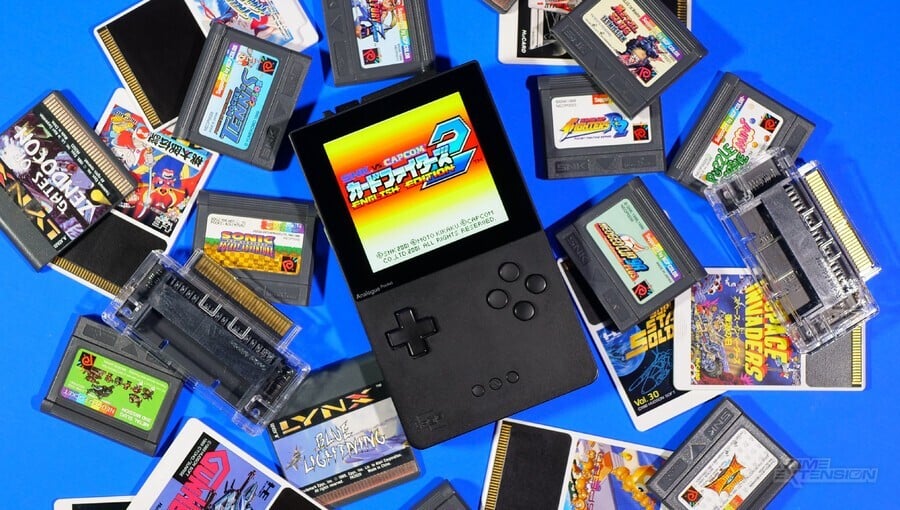
When the Analogue Pocket launched in 2021, it promised many things – one of which was the ability to play original cartridges for a wide range of classic systems.
The handheld can run Game Boy, Game Boy Color and Game Boy Advance titles out of the box, but optional adapters are required to run Game Gear, Neo Geo Pocket, Atari Lynx and PC Engine titles – and the catch is that, at the time of release, only the Game Gear adapter was available.
We've had to wait a few years to get our hands on the other three adapters, but they're finally here – making the Analogue Pocket feel like a more 'complete' system. However, with the community filling the gaps with OpenFPGA cores, is there any need for these adapters so long after release? We're about to find out.
Sold as a $99 three-pack rather than individually, the Analogue Pocket adapters are identical to the original Game Gear one (AP-A01) that launched back in 2021. These fit into the system's cartridge slot, allowing you to insert their respective game media.
Fashioned from shiny transparent plastic, they don't sit flush with the back of the Analogue Pocket, so when you place it screen-up on a flat surface, it wobbles slightly (this might both some people more than others – it didn't really keep us up at night, but we're mentioning it here all the same).
When we tested the Game Gear adapter back in 2021, we noted that it protruded from the back of the console quite dramatically. The same can be said of these new adapters, but the issue is more obvious with some than it is with others.
For example, Neo Geo Pocket carts are quite small, so they don't really stick out when used in the adapter, but PC Engine / TG-16 / SuperGrafx HuCards stand out in an almost comical fashion, meaning the slightest bump or knock will crash the game. This happened quite a few times during our review period, even though we were super careful.
With Lynx games, the issue is a little less, as the carts are slightly shorter – but you'll definitely want to be careful during use that you don't bash the cart against something accidentally. Only the strongest knocks will actually dislodge the cart, as the adapter's grip is fairly strong (especially in the case of the NGPC version), but even the slightest movement will cause some games to crash.
Outside of the physical quirks, the Analogue Pocket adapters do precisely what they were intended to do – open up the handheld's already impressive library of physical games. Pop a cartridge in the slot, and you'll be able to view information (developer, publisher, release date) before it is loaded into the Pocket's FPGA for pixel-perfect emulation.
All of the titles we tested performed flawlessly, although some of the Lynx games required a delicate cleaning before they would load properly (which is obviously not the Pocket adapter's fault).
As was the case with Game Boy formats, the Analogue Pocket adapters support flash carts, so we were able to happily use our Retro HQ NeoPocket Game Drive to load up any Neo Geo Pocket title we desired (a fan-translated version of SNK vs Capcom: Card Fighters Clash 2 was the first thing we booted up).
So, there's plenty to like here – but the elephant in the room is the fact that the Analogue Pocket's OpenFPGA system means that it's already possible to play PC Engine and Neo Geo Pocket titles on the console (the NGP core is still a WIP, but it's coming along nicely).
It's also worth noting that we'll almost certainly get an FPGA core for the Lynx sooner rather than later, which makes this adapter set redundant – unless, of course, you intend to leverage your existing collection of games rather than resort to loading ROMs onto your SD card. To be fair, that was always the intention with the Pocket, and support for OpenFPGA cores is more of a bonus.
Another gripe we have is that the adapters can only be purchased in a three-pack, which isn't ideal if you have a massive PC Engine collection but don't have any interest in Neo Geo Pocket or Lynx games (or any combination of those formats, to be fair). The Game Gear adapter was sold on its own, so we've no idea why Analogue has chosen to remove that flexibility with these new ones.
Analogue Pocket Adapters Review - Conclusion
They've taken their sweet time to get here, but the Analogue Pocket adapters finally open up the console's physical library, giving you access to some truly amazing portable games.
The modular nature of the machine – and its ability to accurately replicate these systems via FPGA – is a real boon. We also love the fact that the Analogue Pocket's massive built-in library can recognise each cartridge – and, if you wish, you can even add thumbnail images to liven the UI up further.
It's a shame that PC Engine and Lynx games protrude so dramatically from the top of the console, as it means you have to be super careful during use. This is less of an issue if you're playing on the TV via the Pocket's dock, of course – and it doesn't really impact Neo Geo Pocket games, as they're smaller and don't stick out as much.
If you've been using the Analogue Pocket's ability to play ROMs via its OpenFPGA system – and you don't have a large collection of physical carts (and don't plan to have one in the future) – then you might want to think twice before investing in this set of adapters.
However, if you purchased the Pocket with the promise of keeping physical media alive, then you'll almost certainly get your money's worth out of this set – even if we'd rather people had the option to pick them up separately.

